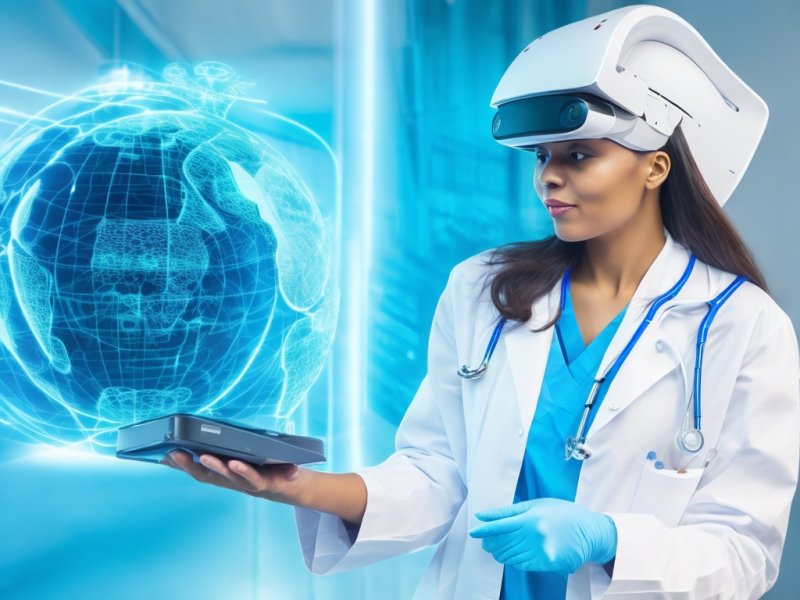
Introduction:
In recent years, the healthcare industry has witnessed a remarkable transformation, driven by the rapid advancement of emerging technologies. Artificial Intelligence (AI), Robotics, and Virtual Reality (VR) are revolutionizing the way we approach medical care, diagnosis, treatment, and even patient experiences. In this blog post, we will delve into the incredible potential of these technologies and how they are reshaping the landscape of healthcare.
1. Artificial Intelligence (AI) in Healthcare:
AI has emerged as a powerful tool in healthcare, capable of analyzing vast amounts of data, identifying patterns, and providing valuable insights. Here are some key areas where AI is making a significant impact:
a) Medical Imaging and Diagnostics: AI algorithms can interpret medical images such as X-rays, MRIs, and CT scans, assisting radiologists in detecting anomalies and providing accurate diagnoses. This not only speeds up the diagnostic process but also enhances accuracy and reduces human error.
b) Precision Medicine: By analyzing an individual's genetic information, medical history, and lifestyle data, AI can assist in tailoring personalized treatment plans. This enables healthcare providers to optimize therapies, predict treatment responses, and improve patient outcomes.
c) Virtual Assistants and Chatbots: AI-powered virtual assistants and chatbots are being used to streamline administrative tasks, schedule appointments, provide basic medical advice, and offer support to patients. These AI-driven interfaces enhance patient engagement and reduce the burden on healthcare professionals.
2. Robotics in Healthcare:
Robotic technologies are transforming various aspects of healthcare delivery, ranging from surgical procedures to patient care and rehabilitation. Let's explore some notable applications:
a) Robotic Surgery: Surgical robots enable surgeons to perform complex procedures with enhanced precision, stability, and minimal invasiveness. With robotic assistance, surgeons can achieve greater dexterity and accuracy, leading to reduced complications, shorter hospital stays, and faster recovery times for patients.
b) Remote Surgery and Telemedicine: Robotic systems coupled with advanced telecommunication technologies allow surgeons to perform procedures on patients who are located in remote areas. This capability is particularly crucial in emergency situations and underprivileged regions, ensuring access to quality healthcare for all.
c) Prosthetics and Rehabilitation: Robotics plays a vital role in the development of advanced prosthetic limbs and assistive devices, helping individuals regain mobility and independence. These robotic solutions are increasingly sophisticated, allowing for more natural movements and improved quality of life.
3. Virtual Reality (VR) in Medicine:
Virtual Reality technology is opening up new possibilities in medical education, training, pain management, and mental health treatment. Here are some noteworthy applications:
a) Medical Education and Training: VR simulations offer immersive and realistic training environments for medical students and healthcare professionals. These simulations enable learners to practice complex procedures, develop surgical skills, and gain experience in a risk-free environment.
b) Pain Management: VR has shown promise in reducing pain and anxiety during medical procedures and treatments. By creating immersive and distracting experiences, VR can help patients alleviate pain perception and enhance overall well-being.
c) Mental Health Treatment: VR-based therapy is being explored as a complementary approach for treating various mental health conditions, including phobias, post-traumatic stress disorder (PTSD), and anxiety disorders. Immersive environments allow patients to confront their fears and traumas in a controlled and safe manner.
Conclusion:
The rapid progress in AI, Robotics, and Virtual Reality is transforming the healthcare landscape, offering new possibilities for improved patient care, diagnostics, and medical education. As these technologies continue to advance, it is crucial for healthcare professionals, policymakers, and researchers to collaborate and harness their potential effectively. By embracing and integrating AI, Robotics, and VR into healthcare systems, we can create a future where precision medicine, minimally invasive procedures, and enhanced patient experiences become the new norm.
Share This News